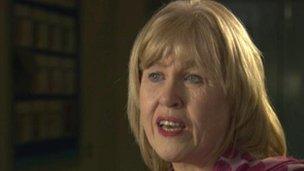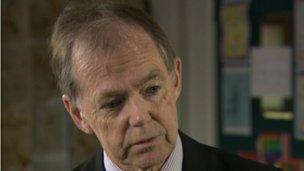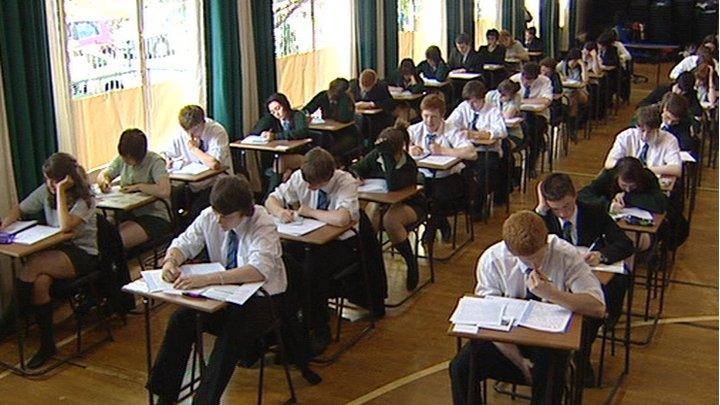NI education: Poorer Protestant boys underachieving
- Published
Dr Paul Nolan said there would be long-term consequences if action was not taken
Poorer Protestant boys in Northern Ireland are seriously underachieving at school according to a new report.
Only Roma and Traveller children are getting poorer results, according to the study by the Community Relations Council.
However, the figures show that 76% of Catholic girls from better off backgrounds are among the highest achievers.
Girls from this background are beaten only by Chinese girls in the UK table.
The study by the Community Relations Council has compared all ethnic groups across the UK using five good GCSE grades as the measure of success.
The report found that just over half of Northern Ireland's Protestant boys who do not get free schools meals achieve five GCSEs.
Dr Paul Nolan, the academic who carried out the research, said there would be long-term consequences if action was not taken.
"They are being locked out of employment. Even if we get investment into places like east Belfast, these kids will not be able to get jobs because they won't have the qualifications," he said.

Carol McCann, principal of St Dominic's, said she was saddened that Protestant boys were falling behind
'Inequalities'
"I think we have been sleep walking into an inequality gap.
"The problem is we're creating inequalities which will later show themselves in the incidents we've seen in recent years in terms of public disorder and a community which feels it has no routes out of poverty, and out of that inequality comes anger and I'm afraid we have an unsettled political future."
BBC News visited two schools to ask the opinion of students and their teachers.
Newtownabbey Community High School in Rathcoole had poor results in the recent past but over the past three years things have turned around.
Principal John Lewis said his pupils had a lot of external pressures.
"Even getting to school is a major achievement for some of them," he said.
"Many of them have complex difficulties and challenges within school and outside. Many of them are easily influenced by other interests out of school, should it be paramilitaries or other attractions."
His students agree. Stephen Baird who is 16, said: "Protestants are taught about flags and the jubilee, whereas I think Catholic teachers want their pupils to do better."
That view is shared by many of the teenagers at the school.
Fifteen-year-old William Glass said: "I think the Catholic religion is stricter than the Protestant one and they go to church more."

Newtownabbey Community High School principal John Lewis said his pupils had a lot of external pressures
His classmate Demi Hutchinson thought it was also to do with boys in general.
"Girls just tend to work harder, they're more concerned about their future whereas boys are more relaxed about that kind of stuff," he said.
All of the GCSE students interviewed were surprised about the report's findings and were unaware that some Protestant boys were falling behind.
Alan Evans, 16, said: "It's the first I've heard of it and I think more people should know about it."
Across Belfast at St Dominic's Grammar School on the Falls Road, the students were much more aware of Protestant underachievement.
A Level student Finola Bradley thought it was down to a different ethos in the Catholic community.
"Our ethos is to better yourself and I think that's why there's such a drive to do well.
"I think in the past, Catholic working class families especially, didn't really have any other opportunity, so education was the way to get out there and I think that's why education is being pushed."
St Dominic's principal Carol McCann is herself a past pupil of her school.
She said she was saddened that Protestant boys were falling behind, but pointed out that her school had its fair share of deprivation and yet the students still did well.
"We have 15% of our girls on free school meals," Ms McCann said.
"That's five times the average for a grammar school, but the students aren't aware of the difference.
"We're not focused on what they've got or what they haven't got. It's about your work ethic and what you do with your talents."
Education Minister John O'Dowd said the results should not come as a surprise.
Mr O'Dowd said: "I welcome the spotlight it is shining on educational underachievement. It is important that we engage in an informed debate about the future of our education system and I believe this report will be a welcome addition to this debate.
"The figures for young people from all disadvantaged sections of our community are simply unacceptable."
Mr O'Dowd says he's working hard to tackle the inequality.
- Published30 September 2013
